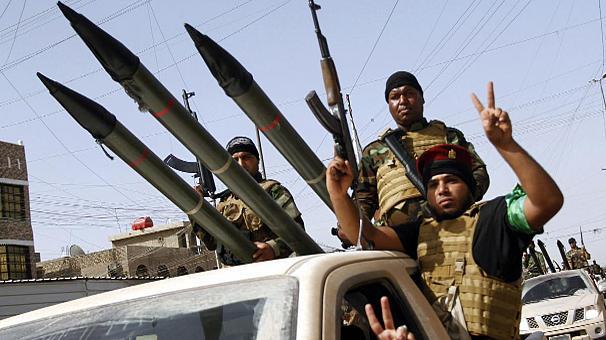
SUNNI WON'T STOP

Sunni tribes battling the Shiite-led government of Iraq won't stop until Prime Minister Nouri al-Maliki steps down, a clan chief said. Then they want to set up their own autonomous region within a united Iraq.
"There is no way back," Najih al-Mizan, a leader from the Albu-Rahman tribe in the northern city of Samarra in Salahuddin province, said by phone. "We're going to form our own federal territory based on the Iraqi constitution."
The al-Qaeda breakaway group that last month escalated its offensive against the state has been joined by some clans who accuse Maliki of excluding Sunnis from government. The premier, whose party won the most parliamentary seats in April's election, has defied calls from across the sectarian divide for him to step down, while rivals have been unable to garner enough support to force him from office. Parliament, which had been due to sit today, won't meet until mid-August amid the impasse.
The tribesmen aren't fighting for the caliphate that the Islamic State fighters have proclaimed in territory they control, and will deal with the militant threat once their demands are met, al-Mizan said. In addition to removing Maliki, they're seeking an emergency government of technocrats, the disbanding of Shiite militias, and the restoration of an independent judiciary, he said.
The partial Sunni uprising -- other tribes have remained loyal to the government -- and an emboldened push for independence by ethnic Kurds have raised concerns Iraq may fracture along historic fault-lines.
Protest Camps
This is a "defining crisis for the modern Iraqi state," said Ali Allawi, a minister in governments following the dismantling of Saddam Hussein's regime. "It's the first time in modern history that the state itself is seriously questioned," he said in a July 2 conference call organized by Arabia Monitor. "The way the Iraqi political class is responding may exacerbate a de facto split."
Maliki has vowed to defeat the "terrorists" threatening the nation's integrity. He has offered an amnesty to Sunni tribesmen who "return to their senses" and haven't shed blood, according to the BBC.
While it was the storming of Mosul by the Islamic State, known then as the Islamic State in Iraq and the Levant, or ISIL, that provided the spark, anger over Maliki's government had been building.
Sunnis set up protest camps in the western city of Ramadi last year, saying Maliki was using anti-terrorism legislation to target them. Unrest escalated after guards protecting popular Sunni Finance Minister Rafih al-Issawi were arrested on terrorism charges and the minister resigned in protest.
Refuge Claim
Demonstrations spread to eight Sunni-dominated regions, including Samarra, which also houses the al-Askari mosque, one of the holiest for Shiites. The camps, which Maliki said were providing a refuge for terrorists, were forcibly closed with about 50 people killed in one raid in Hawija in April 2013, according to Al-Jazeera television.
"We realized peaceful protests won't work so Sunni tribes decided to turn to weapons to get their rights," al-Mizan said from Erbil, capital of the semi-autonomous Kurdish region, carved from Iraq during the 1991 Gulf War.
Al-Mizan last month appeared at a news conference in Erbil with Sheikh Ali Hatem al-Suleiman, head of the Dulemi tribal confederation. With more than 3 million members, it's one of the largest of dozens of Sunni tribes in western Iraq.
Suleiman said Iraq was witnessing "a popular revolution and it won't stop until Maliki is removed."
'Uprising of Oppressed'
Organized and funded by the U.S. into so-called Awakening Councils, the Sunni clans played a key role in ending the war that ravaged Iraq following the toppling of Saddam.
After control of the councils passed to Maliki's government in 2008, he reneged on vows to integrate fighters into the security forces and stopped salaries.
Former Prime Minister Ayad Allawi, a secular Shiite lawmaker, said the Islamic State is taking advantage of "the favorable political landscape of sectarianism" and described the insurgency as "an uprising of the oppressed."
"Ex-Baathists, ex-army, tribal leaders, academics, ordinary citizens and the old resistance" to the U.S. military are fighting the government, he said in an e-mailed response to questions. "I don't know who's leading them but they, with their families, reach millions."
Al-Mizan won a seat in the April election, only to lose it following a judicial review. After the Islamic State seized Mosul, he fled to the safety of Erbil along with other tribal leaders.
Sunnis look to the Kurdish region as an inspiration for the self-governing region they want to establish in the provinces of Anbar, Salahuddin and Nineveh, al-Mizan said.
"About 90 percent of Sunnis in these provinces would go for a semi-autonomous region," he said. "We'd form our own government, parliament and army -- the same way the Kurds did."
bloomberg.com





